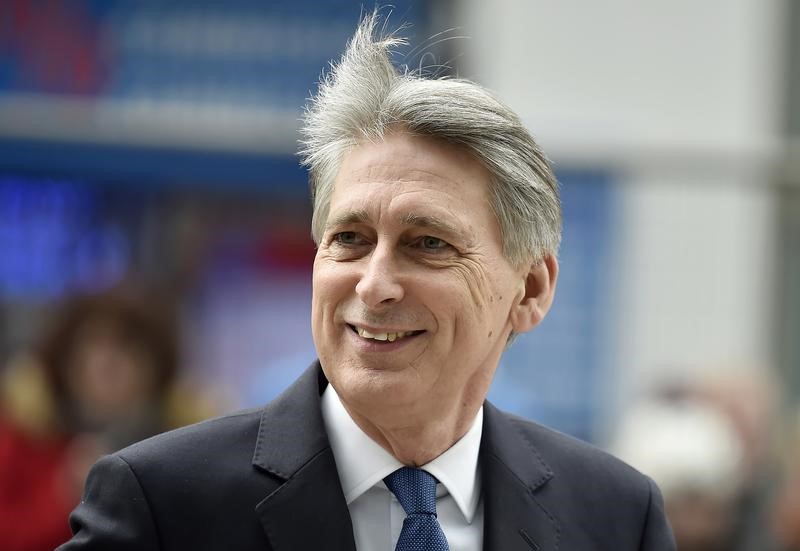By William Schomberg
LONDON (Reuters) - British finance minister Philip Hammond will probably have some rare good news about the country's weak public finances when he delivers his first full budget plan next week, but he is unlikely to bow to demands for higher spending.
Belying immediate concerns about last June's vote to leave the European Union, the economy remained robust in 2016 and tax revenues have continued to flow strongly into the government's coffers.
That gives Hammond a chance to announce on Wednesday a big upgrade to official economic growth forecasts for 2017 and the first cut since 2014 in the amount of money that Britain needs to borrow over the next five years.
The slight easing of the budget squeeze coincides with calls on Hammond to spend more on Britain's stretched health service, its prisons, police and other public services. Also, retailers want help ahead of a big rise in their property taxes.
But Hammond, the chancellor of the exchequer, has signaled he will not significantly relax his cautious approach to the budget.
The economy has started to show some signs of slowing. And the real challenge of leaving the European Union is about to begin with the divorce negotiations due to start this month.
"Rather than go on a spending spree, we expect the chancellor to let borrowing fall at a faster rate than before and save any major giveaways for closer to the next general election, scheduled for 2020," Capital Economics, a consultancy, said in a note to clients.
"And of course, if the economy were to weaken by more than expected as the EU negotiations get underway this year, Mr Hammond will have another opportunity to announce another raft of measures in the next budget in the autumn."
A BIT LESS BORROWING
Since 2010, when the ruling Conservatives returned to power, initially in coalition, Britain's budget deficit has fallen from 10 percent of gross domestic product to about 3 percent now. But it remains one of the biggest among the world's rich economies.
And while less borrowing would be good news for Hammond, the reduction is likely to be modest at between 25 billion and 45 billion pounds over the five-year forecast period that will underpin his budget plan, private economists say.
That would compare with an increase of 122 billion pounds announced in November when the impact of the Brexit vote on economic growth was first factored into the forecasts.
Against that backdrop, Hammond is unlikely to do much to meet the promises of Prime Minister Theresa May to help "just about managing" workers, many of whom vented their frustration with years of low earnings growth by voting for Brexit last year.
May and Hammond want to turn the budget deficit into a surplus during the first half of the next decade, meaning more spending cuts in the years ahead.
But the government is sticking to its expensive promises of cuts to income and corporation tax, while it is hoping that a higher minimum wage will help many lower-paid workers.
That approach faces a stiff test in the next few years with inflation already rising fast, thanks to the post-Brexit vote slump in the value of the pound.
The independent Institute for Fiscal Studies said on Thursday that more children would fall into absolutely poverty over the next five years as the rise in inflation eats into the value of most working-age welfare benefits.
And the impact of rising inflation threatens to be felt beyond the country's poorest families.

Britain's economy has relied for years on spending by consumers as its main driver. The prospect of a hit to their spending power has added urgency to the government's attempts to turn exports and investment into a bigger driver of growth, something Hammond is likely to want to address his budget plan.
(Graphic by Michael Ovaska Editing by Jeremy Gaunt)